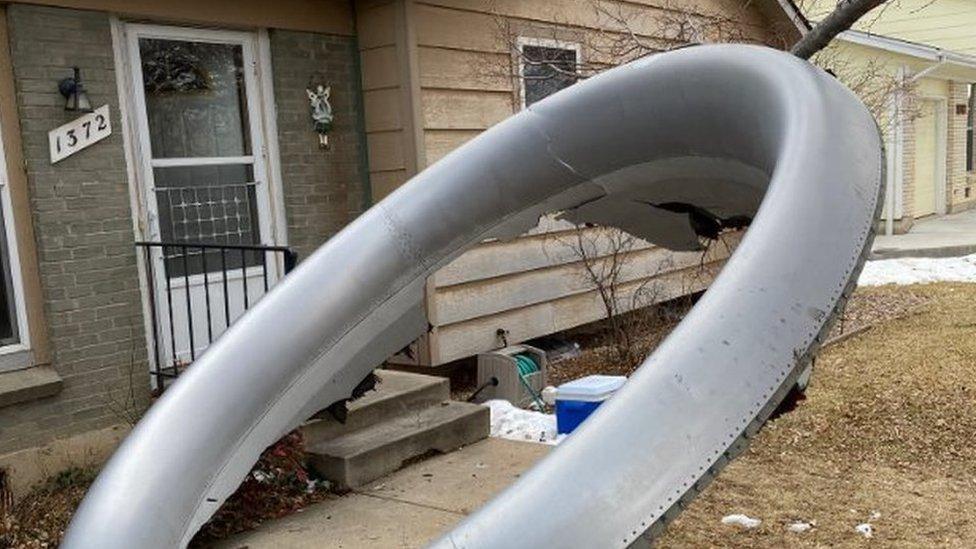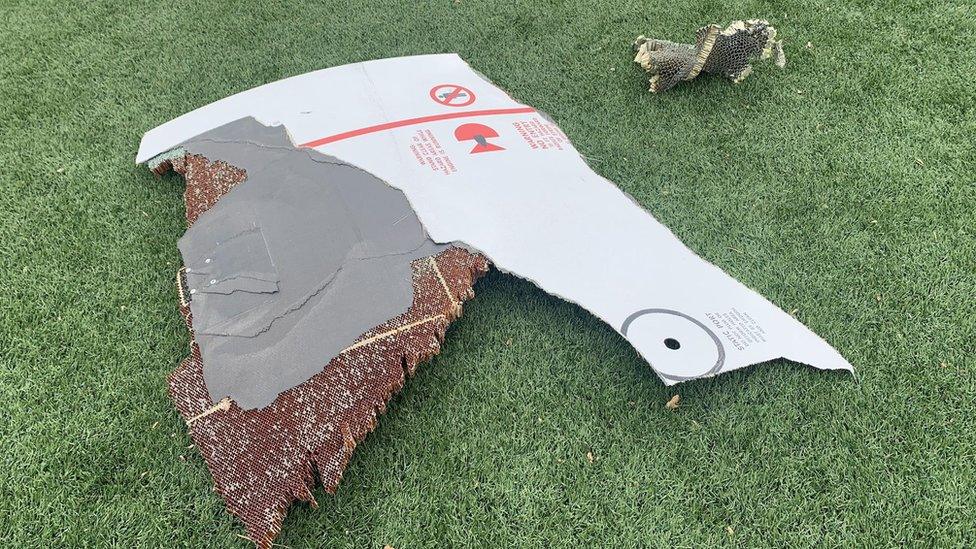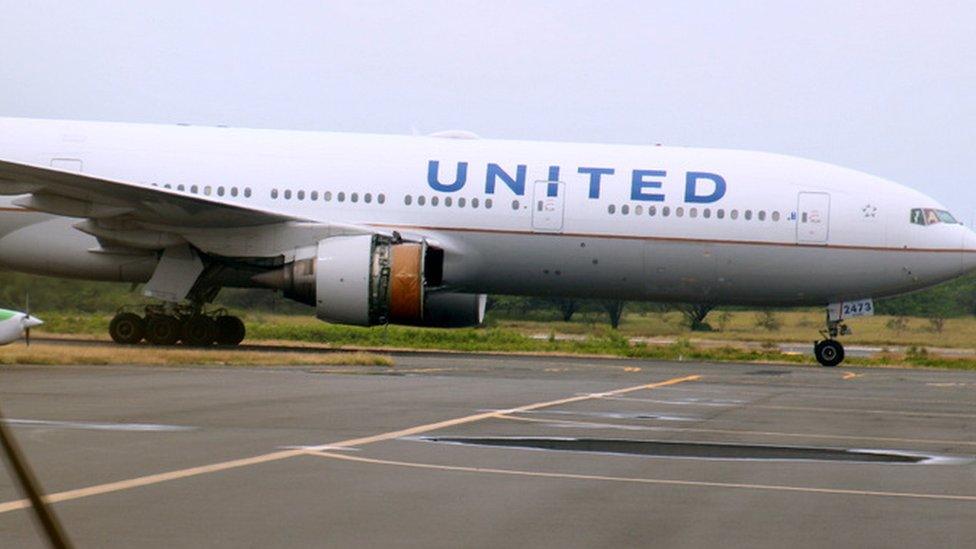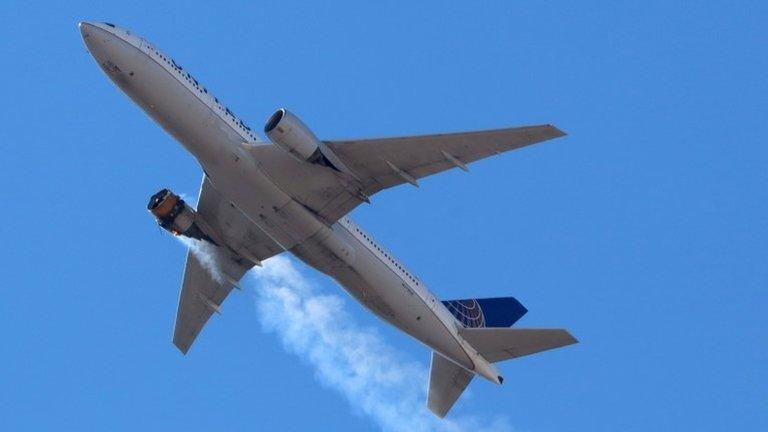Boeing 777: Dozens grounded after Denver engine failure
- Published
US plane engine fire: "I just knew something was wrong"
US plane manufacturer Boeing has recommended grounding all of the 777-model aircraft which have the same type of engine that suffered failure and shed debris over Denver on Saturday.
It said 128 jets should be suspended until inspections are carried out.
United Airlines and Japan's two main operators have already stopped using 56 planes with the same engine.
Flight 328, carrying 231 passengers, was forced to make an emergency landing at Denver airport. No-one was injured.
"While [an] investigation is ongoing, we recommended suspending operations of the 69 in-service and 59 in-storage 777 aircraft powered by Pratt & Whitney 4000-112 engines," the company said in a statement.
Pratt & Whitney said it had dispatched a team to work with investigators.
According to the Federal Aviation Administration (FAA), United is the only US airline flying this model of 777, with the others being in Japan and South Korea.
Korean Air, which has six planes in operation and 10 in storage, said it was awaiting instruction from South Korean regulators regarding any measures for its 777 jets.
United Flight 328, bound for Honolulu, suffered a failure in its right-hand engine. Debris from the jet was found scattered over a nearby residential area after it returned to Denver airport.

Debris from the engine was found scattered in a residential area
The agency has ordered extra inspections of Boeing 777 jets fitted with the Pratt & Whitney 4000 engine following the incident. "We reviewed all available safety data following [Saturday's] incident," said FAA administrator Steve Dickson in a statement.
"Based on the initial information, we concluded that the inspection interval should be stepped up for the hollow fan blades that are unique to this model of engine, used solely on Boeing 777 airplanes."
The FAA met representatives from the engine firm and Boeing on Sunday evening.
The initial finding of the National Transportation Safety Board (NTSB) is that most of the damage occurred in the right engine, where two fan blades were fractured and other blades also impacted. The main body of the aeroplane suffered only minor damage.
The engine failure is the another blow for Boeing after its 737 Max aircraft was grounded for 18 months following two aviation accidents that left 346 people dead.

Rare, but dangerous, incident

Aircraft engine failures are rare. Uncontained failures, where debris can erupt from the engine in any direction are mercifully very rare indeed. But an uncontained failure is also much more dangerous.
A modern twin-engine airliner is designed to be able to fly safely for hours using a single engine.
The shrapnel from an uncontained failure, however, can cause serious damage to the rest of the plane, and if it passes through the cabin, it can be lethal. Experts say the failure in the Denver incident appears to have been uncontained, but the damage to the aircraft itself was thankfully minor.
Also worrying is that the incident itself appears to have a number of similarities with another failure that occurred on a United Airlines flight in 2018.
If the cause in this case is found to be the same - and remember, it may not be - that would raise questions about why the response to that incident from the manufacturer and regulators was unable to prevent a repeat.

'Shaking violently'
Passengers on board the Denver flight described a "large explosion" , external shortly after take-off.
"The plane started shaking violently, and we lost altitude and we started going down," David Delucia said. He added that he and his wife placed their wallets in their pockets so that "in case we did go down, we could be ID'd".

No-one was injured in Saturday's incident with the United plane
Police in the town of Broomfield posted pictures of what appeared to be the front of an engine-casing in the front garden of a home. Other fragments were seen around the town, including on a football field.
No-one was injured by the falling debris.
In Japan, all 777s with the Pratt & Whitney 4000 model engines are to avoid its airspace until further notice. This includes take-offs, landings and flights over the country.

A similar incident happened at Honolulu in 2018
The government there has also ordered JAL and ANA airlines to suspend the use of its 777s with the same model engine.
Last December a JAL flight was forced to return to Naha Airport due to a malfunction in the left engine - the plane is the same age as the 26-year-old United Airlines plane from Saturday's incident.
In 2018, the right engine of a United Airlines plane broke shortly before it landed in Honolulu. Following an investigation, the NTSB said the incident was caused by a full-length fan blade fracture.
- Published21 February 2021

- Published22 January 2021
